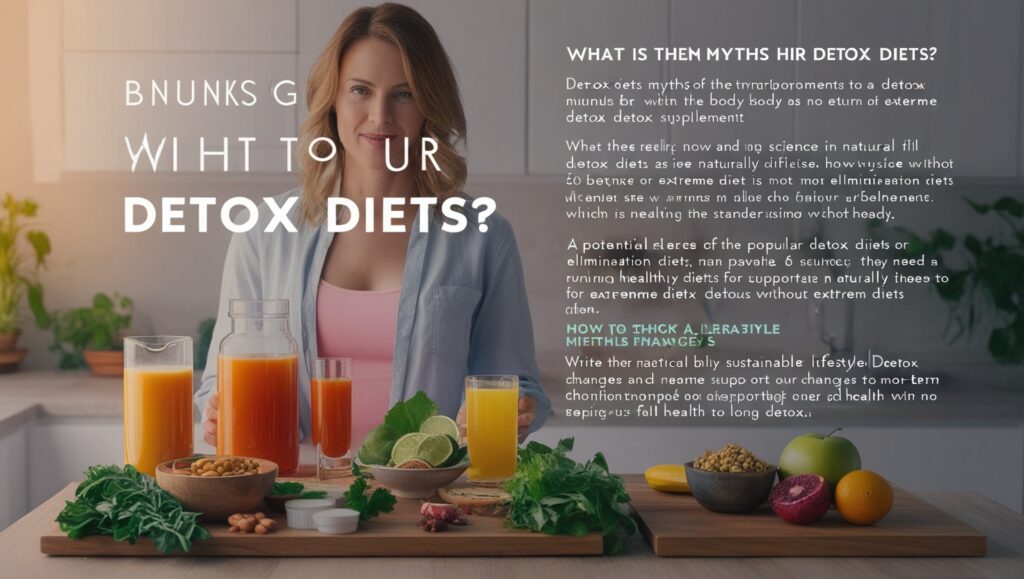The Truth About Detox Diets What You Need to Know
Detox diets have become a popular trend among those looking to quickly reset their health, shed a few pounds, or combat the effects of unhealthy habits. Promising results like increased energy, better digestion, clearer skin, and rapid weight loss, these diets often come with bold claims. However, it’s essential to separate fact from fiction when considering a detox diet. Understanding what detox diets can and cannot do is key to making informed decisions about your health. This blog will explore the science behind detox diets, their benefits and risks, and practical alternatives for supporting your body’s natural detoxification processes.
1. What Are Detox Diets?
Detox diets are short-term dietary interventions designed to eliminate toxins from the body. They often include a combination of fasting, consuming specific foods, juices, or herbal supplements, and avoiding certain food groups like processed foods, sugar, dairy, and gluten. The idea is that these diets help the body cleanse itself from accumulated toxins that can negatively impact health.
Common detox diet practices include:
- Juice cleanses: Drinking only fruit and vegetable juices for a set period.
- Liquid fasts: Consuming only liquids, such as water, herbal teas, and broths.
- Detox supplements: Taking pills or powders marketed to support liver and kidney function.
- Elimination diets: Avoiding specific foods to ‘reset’ the body.
2. How Does the Body Naturally Detoxify?
One of the most significant misconceptions surrounding detox diets is the belief that the body needs external help to detoxify effectively. In reality, the human body is naturally equipped with complex systems designed to eliminate toxins. The liver, kidneys, lungs, skin, and digestive system all play vital roles in processing and expelling waste products and toxins.
- Liver: The liver filters blood and neutralizes harmful substances by converting them into waste products.
- Kidneys: The kidneys filter the blood to remove waste and excess fluids, which are expelled as urine
- .Lungs: The lungs expel carbon dioxide and help maintain the balance of oxygen in the body.
- Skin: Sweat glands help eliminate waste products through perspiration.
- Digestive System: The intestines eliminate solid waste, and beneficial bacteria help maintain a healthy gut environment.
3. Do Detox Diets Work?
The effectiveness of detox diets is a topic of debate among health experts. While there are anecdotal reports of individuals feeling better after completing a detox diet, scientific evidence supporting their efficacy is limited. The majority of health professionals agree that the body’s natural detoxification mechanisms are sufficient for most people and that detox diets are often unnecessary for those in good health.
Some detox diets may help people adopt healthier eating habits by temporarily eliminating processed foods and increasing the intake of fresh fruits and vegetables. However, any perceived benefits are often due to the sudden reduction of unhealthy foods and the increase in nutrient-dense options rather than the ‘cleansing’ effect of the diet itself.
4. Potential Benefits and Risks
Benefits:
- Increased intake of fruits and vegetables: Detox diets often emphasize whole, plant-based foods, which can contribute to better nutrition.
- Temporary break from unhealthy foods: Detox diets may serve as a starting point for healthier long-term eating habits.
- Improved hydration: Many detox plans promote the consumption of water and herbal teas, which can support hydration.
Risks:
- Nutritional deficiencies: Restrictive detox diets can lead to a lack of essential nutrients, such as protein, healthy fats, and certain vitamins.
- Loss of muscle mass: Prolonged fasting or low-calorie diets can lead to muscle loss rather than fat loss.
- Metabolic slowdown: Extreme calorie restriction can cause the body to lower its metabolic rate, making weight management more challenging in the long term.
- Dehydration: Some detox diets, especially those that use laxatives or diuretics, can lead to dehydration and electrolyte imbalances.
5. Alternatives to Detox Diets
Instead of following a potentially harmful detox plan, consider these healthier ways to support your body’s natural detoxification process:
- Stay hydrated: Drinking plenty of water helps flush out waste products and supports overall bodily functions.
- Eat a balanced diet: Include a variety of whole foods such as fruits, vegetables, lean proteins, whole grains, and healthy fats.
- Increase fiber intake: Fiber helps maintain a healthy digestive system and supports the elimination of waste
- .Exercise regularly: Physical activity improves circulation and supports the body’s ability to detoxify.
- Limit processed foods and added sugars: Reducing consumption of processed and sugary foods can improve liver function and overall health.
- Get enough sleep: Quality sleep is crucial for the body’s ability to repair and detoxify itself.
Final Thoughts
While the idea of a quick detox may be appealing, it’s important to approach such diets with a critical eye. The body is highly capable of detoxifying itself without extreme measures, and the most sustainable way to support your health is by maintaining a balanced, nutrient-rich diet and a healthy lifestyle. Before embarking on any detox plan, consider consulting a healthcare professional to ensure it aligns with your health needs and goals.


